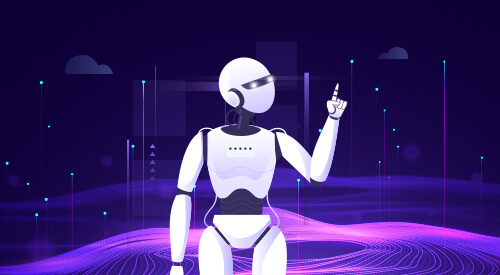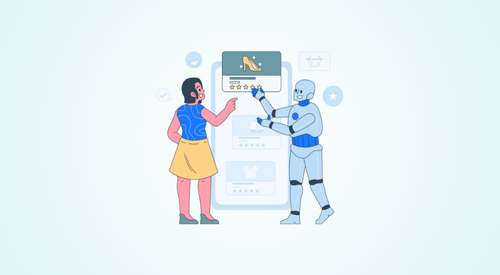

According to Forbes, companies using GenerativeAI in sales have reported up to a 50% increase in leads and reduced costs by up to 60%. Enterprise Generative AI is redefining business operations, terraforming the way technology and people collaborate for a new era in automation. In this blog, we will delve deeper into the best practices, implementation tips, and the future of Enterprise Generative AI as a nexus for automation, creativity, and data.
From Data to Innovation: Leverage Generative AI the Right Way
The creator economy is presently estimated to be worth approximately $14 billion annually. As per a report by Fortune Business Insights, the generative AI market’s growth trajectory signifies a compelling compound annual growth rate (CAGR) of 47.5% by the end of 2030. GenAI, short for Generative Artificial Intelligence, represents the pinnacle of artificial intelligence’s creative potential. Cloud storage solutions, along with AI advancements, significantly drive GenAI’s growth. The rise in content creation and the need for creative applications also play crucial roles in its upward trend.
Enterprise Generative AI: Bridging the Gap between Automation, Data, and Creativity
Traditionally, data and creativity have been perceived as separate realms within enterprises. Data has been the backbone of decision-making, providing insights, patterns, and metrics to guide strategies. Creativity, on the other hand, has been the realm of human ingenuity, fueling ideation, design, and problem-solving. However, the boundaries between these domains are blurring significantly.
Generative AI stands at the forefront of this convergence, leveraging data to drive creative processes in unprecedented ways. It does so by analyzing vast datasets to identify patterns, trends, and correlations that may elude human analysts, and doing so at a faster pace, too! It then uses this knowledge to generate content, ideas, or solutions that are not only data-driven but also contextually relevant and imaginative. For example, Google Cloud’s Generative AI enhances the American international fast food restaurant chain, Wendy’s drive-thru experience by automating complex orders, catering to customer preferences while ensuring accuracy, streamlining the ordering process for an improved customer and staff experience.
In content generation, Generative AI can analyze user preferences, market trends, and historical data to craft personalized product recommendations or generate engaging marketing copies. In art and design, it can use data on artistic styles and cultural trends to create visually stunning and culturally relevant designs. This capacity to marry data-driven insights with creative output opens up new horizons for enterprises seeking to innovate and engage their audience in novel ways. And considering the time saved by the automation factor only makes it a must-have for enterprises.
With its impressive abilities, Generative AI is becoming a catalyst for innovation across industries. It not only reduces the burden of repetitive and time-consuming tasks but also frees up human resources to focus on high-value, strategic endeavors. In essence, Generative AI acts as the conduit through which data and creativity converge, enabling enterprises to not only automate optimum data use, but also do so creatively. This synergy is reshaping how businesses operate, from content creation to product development.
The Potential Impact of Generative AI for Enterprises
The journey of Generative AI has been nothing short of remarkable, but what lies ahead is even more exciting. Imagine if you wanted to learn something, like how far the moon is from Earth. Right now, if you asked a model, it would give you a written explanation. But soon, it might do even more. It could show you a picture, a video, or even a 3D model to help you understand visually. Instead of just words, you’d see things like the moon, Earth, and a line between them. Let’s explore the potential and key trends that we can expect to see in the realm of Generative AI for businesses.
- Autonomous Learning Models on the Horizon: In the evolving landscape of Generative AI, self-teaching models are taking center stage. These models, often referred to as Large Language Models (LLMs), have the extraordinary capability to independently discern patterns within vast and unlabeled datasets. This autonomous learning serves as a starting point for AI to acquire knowledge. However, the industry is awakening to the necessity of carefully vetting and refining data and fine-tuning models to ensure optimal results. This recognition of the importance of refining the learning process paves the way for more accurate, context-aware, and reliable AI applications.
- Personalization at Scale: Generative AI is set to revolutionize personalization. Enterprises will be able to deliver highly customized products and services, tailoring their offerings to individual preferences on a mass scale. Whether it’s personalized marketing content, product recommendations, or educational materials, the future of Generative AI will empower businesses to cater to each customer’s unique needs.
- Enhancing User-Friendly Customization: Innovations within the realm of Large Language Models have democratized access to AI. These advancements make it increasingly user-friendly and accessible for businesses to customize information and experiences for a diverse spectrum of employees and customers. Whether it’s tailoring content to different languages, industries, or individual preferences, Generative AI is becoming a versatile tool for addressing the unique needs of various user groups within enterprises and beyond.
- Transitioning from Universal to Specialized Models: The initial wave of Generative AI introduced models with broad proficiencies across a multitude of tasks. However, these models often struggled when applied to specific, niche domains. As Generative AI matures, it is poised to evolve into an industry-specific and field-specific tool. The future will witness the development of models fine-tuned for particular purposes, offering precision and effectiveness in addressing unique challenges across various industries and sectors.
- Innovative Applications Grounded in Foundational AI Models: The future holds a proliferation of applications built on the foundation of Large Language Models (LLMs) or conditioned LLMs to meet specific needs. Early examples include web navigation concierges that assist users in finding the information they seek and code development assistants that help streamline software development. These applications are just the beginning, and we can expect to see a wide array of AI-powered tools designed to optimize various tasks and processes in the business world.
- The Emergence of Open-Source AI Models: In the initial stages of Generative AI development, many models were relatively proprietary and closed off. However, a shift towards open-source LLMs is gaining momentum. Open models offer increased transparency, customization options, and cost-effectiveness. This transition to more open models empowers businesses to have greater control over their AI solutions, fostering innovation and collaboration within the AI community.
- Augmenting LLM Capabilities: Through Plugin Ecosystems: Generative AI vendors are increasingly embracing the concept of plugin ecosystems to augment the core capabilities of LLMs, making them more task-specific. This approach allows for the integration of specialized functionalities into existing AI models, extending their versatility and adaptability. As a result, LLMs can be finely tailored to cater to a wide range of applications and tasks, further enhancing their value for enterprises.
- Reinventing Enterprise Search with LLMs: A new generation of enterprise search tools is harnessing the power of Large Language Models (LLMs) to revolutionize data accessibility. By incorporating LLMs, these tools enhance the precision and relevance of search results, making it easier for users to access the specific information they need. This innovation is poised to streamline data retrieval and knowledge management, fostering efficiency and productivity in enterprise operations.
- Human-AI Collaboration: The future of Generative AI will be marked by a deeper collaboration between humans and AI. Rather than replacing jobs, AI will become a creative partner, assisting humans in problem-solving, content creation, and decision-making. This synergy will amplify human creativity and productivity. GenAI can even help people from various backgrounds come up with innovative ideas that bridge different industries and domains.
- Real-time Adaptability: In the coming years, Generative AI will exhibit real-time adaptability. It will respond to changing circumstances, market dynamics, and user behaviors in ways that are currently unimaginable. Businesses will have access to dynamic AI systems that adjust strategies, content, and responses on the fly.
- Ethical and Responsible AI: As Generative AI becomes more integral to business operations, ethical considerations will come to the forefront. The responsible use of AI, addressing issues like bias, privacy, and transparency, will be a paramount concern. Enterprises will need to implement robust ethical frameworks to ensure the ethical application of Generative AI.
As businesses prepare to embrace this future, it’s advantageous to stay at the forefront of AI developments, invest in responsible AI practices, and explore the limitless possibilities that Generative AI has to offer. In order to make the most of it, the right implementation strategy then becomes crucial.
Implementing Enterprise Generative AI – Best Practices
Gartner forecasts that by 2025, approximately 75% of B2B sales teams will enhance their conventional sales strategies by incorporating AI-driven sales guidance solutions. However, implementing Generative AI in your enterprise is a significant step toward embracing the future of automation and innovation. To ensure a smooth and successful integration, it’s crucial to follow a well-considered plan. In this section, we’ll provide practical steps and key tips for a successful Generative AI implementation strategy, stemming from our expertise in the field.
Best Practices for Businesses Looking to Adopt Generative AI
- Assessment and Planning: Begin by conducting a thorough assessment of your enterprise’s needs and objectives. Identify areas where Generative AI can bring the most value, whether it’s in content generation, design, customer service, or data analysis. Develop a clear plan that outlines your goals, budget, and timeline for implementation.
- Data Preparation: Generative AI relies heavily on data. Ensure that your data is clean, structured, and readily accessible. You may need to invest in data cleansing and preprocessing to maximize the effectiveness of your AI models.
- Technology Selection: Choose the right Generative AI technology that aligns with your business goals and capabilities. Evaluate different AI vendors and platforms, considering factors like scalability, ease of integration, and the availability of pre-trained models.
- Training and Testing: Once you’ve selected a Generative AI solution, allocate time and resources for model training and testing. This phase is crucial for fine-tuning the AI algorithms to meet your specific needs.
- Integration: Seamlessly integrate Generative AI into your existing systems and workflows. This may require collaboration with your IT department or external experts to ensure a smooth transition.
- Monitoring and Evaluation: Implement robust monitoring tools to continuously assess the performance of your Generative AI solutions. Regularly evaluate key metrics and make necessary adjustments to improve results.
Tips for a Successful Implementation Strategy
- Cross-Functional Collaboration: Involve stakeholders from various departments, including IT, marketing, and operations, in the implementation process. Cross-functional collaboration ensures that Generative AI aligns with the overall business strategy.
- Training and Skill Development: Invest in training your workforce to understand and utilize Generative AI effectively. This may involve upskilling existing employees or hiring new talent with AI expertise.
- Change Management: Prepare your organization for the cultural and operational changes that Generative AI implementation may bring. Communicate the benefits, address concerns, and encourage a culture of adaptability and innovation.
- Continuous Improvement: Generative AI is not a one-time solution; it requires ongoing optimization. Stay up-to-date with advancements in AI technology and regularly assess and refine your Generative AI strategies.
- Ethical Considerations: Be mindful of ethical considerations related to AI, such as bias and fairness. Implement ethical guidelines and practices to ensure responsible AI usage within your organization.
With the right implementation strategy that is tailored for business requirements, we at Niveus are driving transformational impact across industries.
GENius – The Niveus GenAI Solutions
Niveus pioneers transformative Generative AI solutions, tailoring cutting-edge technology to optimize operations and foster innovation. By understanding unique client needs, Niveus delivers adaptive solutions that evolve alongside businesses, ensuring ongoing support and growth in the ever-changing AI landscape. This commitment drives businesses towards enhanced productivity, innovation, and sustainable growth.
Features of Niveus’ GenAI Solutions
Niveus, as a solution provider, ensures the optimal selection of technology and partners for Generative AI implementation. Here’s how.
- Scalability: We emphasize selecting technology that scales with business growth, accommodating increased data demands and processing volumes, aligning with future expansion plans.
- Data Security: We prioritize data security, endorsing technologies compliant with industry standards and regulations, ensuring partners committed to robust data protection.
- Customization: At Niveus, we advocate for customizable Generative AI solutions, aligning with unique business needs rather than adopting one-size-fits-all approaches.
- Responsible AI Practices: We promote responsible AI vendors who prioritize ethical development, addressing bias, transparency, and data privacy for an ethical AI deployment.
GenAI Use Cases With Niveus
Niveus maximizes GenAI solutions by integrating industry-leading best practices for seamless and effective implementation, ensuring optimal performance and results. Our GenAI solutions range across a variety of use cases. Here are a few –
We use GenAI to improve how businesses search for images and create content. It’s meant to help generate blogs and articles more quickly. GenAI’s image-based prompts will be used to personalize content creation. The solution involves:
- Image search using Google Enterprise Search on Gen App Builder
- Automatic image captioning with Vertex AI, BLIP image caption model for
- Landmark, object labels, and object tracking with Google Vision API
- Customized models for celebrity face recognition, emotion, detection models
- Accurate Brand & Logo identifications
- Landmark & Location enrichment
We help to deploy a GenAI-powered virtual assistant for customer-facing industries, aiming to offer customers a seamless and natural conversational experience while also enhancing the cross-selling of products. This is especially useful for business in highly sensitive fields such as BFSI. The potential impact is substantial:
- An expected 85% customer satisfaction rate
- A 75% acceleration in the account creation process
- Effortless Account creation
- Reduces customer support calls by up to 50%
We designed a GenAI-driven tool to empower analysts and executives by providing conversational access to the organization’s analytical data without requiring technical expertise to retrieve it. The tool helps to:
- Enable data democratization through GenAI
- Reduce Up to 70% in time for answering Analytical questions
- Enhance stakeholder empowerment with GenAI’s conversational interface
Conclusion – Future of Generative AI for Enterprises
On a wider perspective, the future of Generative AI for enterprises is a journey into a world of unprecedented creativity, personalization, and collaboration between humans and machines. GenAI solutions are poised to redefine industries, from healthcare to entertainment to manufacturing. By harnessing the power of artificial intelligence to think, create, and transform the way we work and live, we are looking at a future of new frontiers for almost every field.
Implementing Generative AI in your enterprise is a journey that, when executed strategically, can yield significant benefits in terms of automation, innovation, and competitive advantage. By following Niveus’ playbook on GenAI implementation, businesses can take the right practical steps, make informed technology choices, and adopt a thoughtful implementation strategy. With Niveus, your enterprise can harness the full potential of Generative AI and pave the way for a more efficient and creative future.











